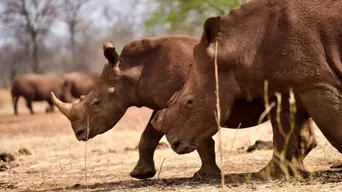Limpopo farmer's push to legalise rhino horn trade
Jane Dutton
17 October 2025 | 11:50Derek Lewitton of Black Rock Rhino Reserve has long pushed for legal horn sales, arguing it could crush the black market.

Lewitton claims 39 rhinos were poached from his reserve and another 60 vanished while he was in prison. Photo: Katlego Jiyane
The global rhino horn trade is worth billions, much of it ending up in Asia.
And one Limpopo farmer got caught in the crossfire.
Derek Lewitton of Black Rock Rhino Reserve has long pushed for legal horn sales, arguing it could crush the black market.
But last December, police raided his property, accusing him of hiding illegal horns, unlicensed weapons and even being in the country illegally.
He said the charges were absurd and meant to silence him.
All charges against Lewitton were eventually dropped, but the National Prosecuting Authority insists the case remains open.
Lewitton said the raid shattered his family and set back his fight to protect rhinos.
"While I sat in jail, poachers killed or stole dozens of my rhinos," Lewitton said.
ALSO READ: Inside the brutal Rhino horn trade: Derek Lewitton's story
The horn trade is run by powerful syndicates at the top, with thousands of poachers feeding them from below.
Keeping it illegal keeps prices soaring, and for some, extinction is good business.
But opening up stockpiles alone won’t kill the black market until corruption and money laundering are rooted out.
That doesn't mean the war can't be won.
"We can destroy the rhino trade. For the rest of history, rhino horn will be a boring commodity... There is a camp that capitalises on rhinos becoming extinct - the value rises when they think it’s a disappearing commodity."
Poaching is evolving. It's smarter, richer and harder to stop as South Africa's rhino war rages on.
Get the whole picture 💡
Take a look at the topic timeline for all related articles.
















